#Regione Siciliane
Explore tagged Tumblr posts
Text

armi santi, armi santi, io sugnu unu e vuatri siti tanti
photo by enzo sellerio
#Enzo Sellerio#ognissanti#festa dei morti#sicily#sicilia#sicilian#sicilian fashion#palermo#italia#day of the dead#defunti#dia de los muertos#dia de muertos#mourning#prayer#art#photography#faith#pray#catholic#catholicism#catholic aesthetic#black and white#blackandwhite#bnw#black and white photography#regione siciliana#sicily italy#siciliano#noir et blanc
110 notes
·
View notes
Note
ciao! i grew up in a very siclian household but i was never taught the language properly, just phrases and what i would use to talk to my nonna. something i've always wondered is a phrase i've used my entire life and so has everyone in my family, but whenever i search it up i cannot find a translation. i've never seen it spelt out, but its pronounced "gatzee"/"gatzi" , and we use it to refer to a small trinket that you don't need and doesn't have any use. any clue if this is a real word or just somethin my family made up? grazie :3
Ciao! I'm not Sicilian so I have no clue about that Regional language (or any of its variations) or sayings. I guess it's spelled "gazzi"? I tried looking up but couldn't find much tbh (aside from a district in Messina).
I cannot help you but maybe someone among this blog's followers here, can :) Please, if anyone can, leave a comment! Thanks!
#it#italian#langblr#italiano#italian language#italian langblr#language#languages#parole words#italian regional languages#sicilian#dialects#minority languages#italian idiomatic sentences#italian regional words#domande asks
27 notes
·
View notes
Photo



Monstrance, Gilded copper, corals and enamel, late 17th century, by an unknown silversmith from Trapani, Sicily
Museo Regionale di Palazzo Bellomo, Syracuse
Photos by Charles Reeza
#metalwork#sacred vessel#Baroque art#Sicilian craftsmanship#Ortigia#Siracusa#Sicilia#Italy#regional art gallery#travel photos#treasure
28 notes
·
View notes
Text
we have a similar concept in italian, except the phrase isn't related to wolves or fucking at all. it's about jesus christ. it's literally about jesus christ and shoes.
"where the lord lost his shoes"
it means "somewhere far/in the middle of nowhere".
do with that as you will.
there's this word in Serbian 'vukojebina' which literally means 'the place where wolves go to fuck' but they use it to mean 'in the middle of nowhere'. it sure does the job well, but the visual stayed with me longer than I would have liked it to.
#im pretty sure it's about the whole jesus in the desert thing where he stayed for like a month or smth idk#anyway the italian language is ridiculously religious#i also have to admit im not sure if this phrase is italian or regional (sicilian)#one thing about sicily#the language there is about 100 times more religious than italian
21K notes
·
View notes
Text
Once in Palermo - local beer

The same day a few years ago in Palermo at a local restaurant. I don't remember how many beers we drank, but I do remember that the local beer called Mesina as well as the Moretti and Peroni beers were very popular! And the summer heat helped us to love them 🍻
-----------
#travelling #exploring #sicyly #palermocity #experience
0 notes
Note
Does Machete (or Vasco) speak more than one language?
Machete is reasonably quick at absorbing new languages, which has been beneficial for someone in charge of Vatican's foreign relations. He has a good grasp of the various Italian languages and dialects and his usual way of speaking is formal, as accentless as possible and doesn't reveal much about his place of origin. His native language is Sicilian, but I assume he's lost most of it due to lack of use. He's fluent in Latin, as he should be, it's the official language of the Catholic church and all it's services. He knows Greek but practically never speaks it, it's mostly a gateway for him to get a better access to a variety of academic literature. His Spanish isn't perfect but it's sufficient for average use, and he's picked up a little bit of French but not nearly enough for him to rely on it alone.
Vasco's Florentine origins are evident in his speech, but like Machete he's had enough exposure to other Northern and Central regional languages that he can understand and speak a few of them at least passably. He knows limited Latin and a smattering of Greek, thanks to both being used extensively in higher education at the time, but he wasn't the most dedicated student and started to forget them quickly after dropping out.
212 notes
·
View notes
Text

NO, DICO!! Ognuno di noi dovrebbe essere pronto a prendersi tirate d'orecchi da tanti, da molti sicuramente meglio di noi, piu' fattivi , più concreti, piu' preparati e piu'..piu'...piu'...Pero' dal ministro Musumeci proprio no. Con uno così, come si fa a porgere l'altra guancia quando punta il suo dito contro chi non ha speso bene i soldi a disposizione delle amministrazioni? Uno che ha regalato ai siciliani autostrade invidiose anche delle vie di campagna per quanto fanno pena. Che ha speso zero euro per ammodernare una rete ferroviaria rimasta tale dai primi anni del '900.. Uno che in 5 anni e' riuscito a dimezzare l'arrivo di acqua potabile nelle case di diverse citta' siciliane da 2 giorni a settimana ad un solo giorno. Uno che in 5 anni ha tolto anche quelle poche gocce d'acqua a disposizione delle imprese agricole di quella regione. No, dai, ministro Musumeci, da lei lezioni proprio no.. @ilpianistasultetto
65 notes
·
View notes
Text
I know this is a joke (very funny). Still, I do feel the need to point out that many of these differences point towards different regional languages, like Sicilian, Sardinian, Tuscan (AKA standard Italian), Ligurian, and Lombardic (among others). Sicily has so many regional differences that we have a dialect for each province in Sicily. They are Sicilian dialects, not Italian. They are no more related to Italian than Spanish dialects are. The same goes for all other languages within Italy. They may not be recognized as separate languages, but that says less about them and more about the Italian government and the national obsession with unification. It's more like, Italian is 20 languages in a trench coat masquerading as 1, with Tuscan as the head talking to people
i love it when italians argue about italian. like we don’t even know how our language really works we just roll with it
#sicily#italy#sicilian#regione siciliana#siciliani#italian#languages#linguistics#lingblr#language stuff#italian politics
179K notes
·
View notes
Text
i've just had someone on tiktok genuinely trying to convince me that christopher nolan shooting part of the odyssey in sicily will boost the region's economy because tourism "increases gdp" and the example she brought to the table was: the rooms at the four seasons / san domenico palace in taormina being completely booked at 4k/night after the white lotus. somehow it will help the average sicilian to be employed as a seasonal worker for the rich. of course it was a med student who goes to taormina "every year".
#mind you she didn't even get that the white lotus is satire of the reach#the sheer stupidity#we should rlly sharpen the guillotine
24 notes
·
View notes
Note
Do you have any favorite regional differences in one myth? Or any fave regional differences in creatures (eg. The different ways to become a werewolf based on where and when you are)
Comparing similar folklore from region to region is always great! But I think my favourite at the moment is the one I discovered most recently, namely the Sicilian version of what most people know as the Grimms' All-Kinds-of-Fur.
In the Grimms' version a princess escapes from having to marry her father (because she is the only one as beautiful as her late mother), by disguising herself in a cloak made of a thousand kinds of fur. She is found by a king who thinks she is an animal, when it turns out she is taken to the palace as a lowly servant. One day she takes of her furry cloak and dresses as a princess again, to go to the king's banquet. He instantly falls in love with her and after two more banquets manages to discover All-Kinds-of-Fur and the beautiful princess are one and the same.
Now the version of this story I fell in love with as a kid is the adaptation in Jim Henson's The Storyteller: Sapsorrow/Straggletag, where they make the relationship between the young King and Straggletag more equal by letting them talk extensively while she's in her disguise and scold him for his pride and vanity. He does not win her until he has proven he respects Straggletag as well as the princess she secretly is.
So imagine my joy when I read a variant of this tale type called Betta Pilusa in Zipes' translation of Laura Gonzenbach's Sicilian Fairy Tales and it goes like this:
After going through the usual method of trying to delay a marriage to her father (asking for three impossibly beautiful, expensive dresses) this young lady (not a princess) asks for a dress made of grey cat fur and escapes to a forest.
A young king goes hunting there and almost shoots her, until she reveals she is not an animal. He asks her name, she says its Betta Pilusa (translated as Hairy Bertha). He asks her if she wants to come to the castle. She says yes, as his maid. He asks where he wants to live, she says in the chicken coop.
The king visits her at the chicken coop every day to talk to her and bring her treats.
He asks if she want to come to the royal ball, but Betta Pilusa grumbles at him that she could never go. Of course she does go, dressed in her first gown, but disappears before the king can stop her.
The first thing the king does is going to tell Betta Pilusa about the mysterious lady and she scolds him for waking her up.
This happens three more times. With the king inviting Betta Pilusa each time and her grumbling and growling at him and then scolding him when he confides in her about how in love he is.
Finally the king is so lovesick that Betta Pilusa bakes bread for him, every time hiding a golden trinket inside it which the king had given to the mysterious lady at the ball.
The cook reveals to the king that it was Betta Pilusa who baked his bread and he finally confronts her and declares that she is the mysterious lady.
Betta Pilusa denies everything and they argue until he resorts to threatening her with almost comical theatricality, after which she dramatically throws off her catskin gown and falls into his arms.
They get married and live happily ever after.
No recap would do it justice, but Betta is so feral (also in her interactions with other servants) and the young king is so honestly interested in her. It's so fun and I'm here for it.
#fairy tales#sicilian folklore#donkeyskin#straggletag#allerleirau#all-kinds-of-fur#laura babbles#sapsorrow
51 notes
·
View notes
Text

sunday morning
#sicilia#sicily#sicilian#art#siracusa#mediterranean#sicilianu#siciliano#regione siciliana#sicilian fashion#rural#1950s#1950s architecture#architecture#rooftop#rural life#ruralcore#rural gothic#rural aesthetic#rural photography#small town#regional gothic#nonna#photography#bw#bwphotography#black and white#blackandwhite#black and white photography#neighbors
69 notes
·
View notes
Text
non-Americans making fun of Americans do so because non-Americans see that American culture and politics are extremely insular and see nothing but itself.
Ah the Europeans are shitting on the States on main again
#also as a side note#europe is diverse too#not just countries but the different ethnicities and regions within those countries#and the food isnt bland#and European history isn't just intercontinental colonization#its thousands of years of history and fighting and mythos#and continental colonization#which is how countries like spain#italy#france#the Uk#and germany were formed#because italian/spanish/french arent ethnicities#they're nationalities#just ask the Sicilians#Corsicans#and the Catalonians#its not supremecy#although im sure some ppl think like that#its being really#really tired of american politics taking up all of the room#like holy crap i know more about American politics as a Canadian that i do about Canadian politics#just because americans take up so much room that we're force fed american culture/identity politics/etc just for existing online
7 notes
·
View notes
Text

Currently Represents: Sicily/Sicilian Region Previously Represented: The Kingdom of Sicily, the Kingdom of the Two Sicilies (along with Romano) Human Name: Rosaria Vargas Birthday: December 25th Height: 5'3"/161cm Family: Roman Empire (Grandfather), Italy Romano (Older Brother), Italy Veneziano (Older Brother), Seborga (Younger Brother), Genoa (Relative) Favorite Flower: Wild violets Favorite Sweets: Cannoli and cassata
My friend got me back into Hetalia a while ago, and I decided to redesign/remake an old OC of mine from almost a decade ago.
...and then a bit more; I have a plan to do comics for her. That is new.
#hetalia#hetalia oc#aph#hws#aph sicily#hws sicily#oc: rosaria vargas#that last one is a personal tag just in case anyone doesn't want to see stuff involving her and can block it#mod's art#aph romano#hws romano#lovino vargas#aph spain#hws spain#antonio fernandez carriedo#aph america#hws america#alfred f jones
20 notes
·
View notes
Text
I find the dialect issue really interesting in Italian, like it’s been a hot second since I studied it (don’t want to get it mixed up with Spanish etc) but I used to be faaaairly profficient-ish. But Italian has some interesting stuff with dialect and language that is of course super political - absolutely I believe that the minority languages of Italy are LANGUAGES, not “dialects,” eg napolitano, Sicilian, Calabrian etc. However! That doesn’t stop the complicating factors that
a) many are (due to repression in part) somewhat unstable and there’s been clear linguistic pushes in the direction of standard Italian
b) many (not all) young people don’t speak their regional language (which is also geographically associated)
c) the minority languages are for the most part still related to Italian and lend easily to blending and mixed forms
d) the standard language in Italian classes for foreigners is that florentine standardized form and they will almost never tell you regional slang or alterations
in essence there’s a dual issue here: minority languages are called “dialects” in a way that is deeply politically loaded, but for many many speakers there is a kind of language spectrum between minority languages (or remnants and borrowings from minority languages and “standard” Italian) that created a lot of…. Actual dialects in modern spoken Italian
but anyway I do think this all encourages a situation where the reality is that the majority of Italian speakers have some kind of mixed form or where regional dialects affect the standard spoken form at LOT , so that when you learn Italian you’re like oh this is easy. I’m getting an a. I’m a b2. Why the fuck can I not understand anyone ever. What is this. Like the standard form/minority language binary are kind of two ends of a spectrum and class will prepare you for like, official tv channels and Dante but not talking. Italians can understand you and they tend to be very very friendly and accommodating in matching that official form and altering their words/grammar, but you can’t easily follow a lot of *their* conversations and daily pronunciation and the literary language is very ornate. There are also not so many resources for this kind of thing
#Learning Italian#I should get back to it at some point I used to be like. B2? I have my essays in it#I’m fascinated by dialects so this is super interesting but for learners it’s a pain#When I asked about college apps i was like do you do dialect? And no one ever did#There are people who learn Italian really well and master regional accents - those who move to Italy esp migrants - but as with Spanish#I’ve noticed the bar is kind of in the ground with anglophones#And there’s interesting stuff with Italian speakers I’ve met shocked anyone is learning their language#Interesting stuff with smaller city and region based linguistic attachments
51 notes
·
View notes
Text
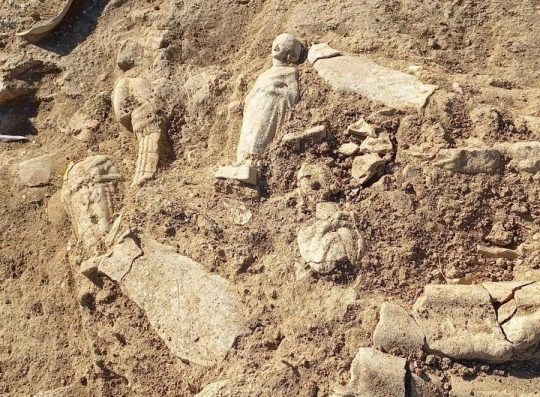
Rich Votive Deposit Discovered in Sicily's Valley of the Temples
At least sixty terracotta figurines, female protomes, and busts, oil lamps, and small vases, a rich votive deposit of bronze fragments were found in the Valley of the Temples in Agrigento, on the southwest coast of Sicily.
The objects were found in House VII b, which forms part of the housing complex north of the temple of Juno. The campaign is fully funded and supported by the Sicilian Region through the Valley of the Temples Archaeological Park, directed by Roberto Sciarratta, and is led by archaeologist Maria Concetta Parello.
In an announcement published by the Sicilian Region Institutional Portal: “The findings allow us to understand the dynamics of the destruction of Agrigentum in 406 BC by the Carthaginians, when the inhabitants had to flee in exodus towards the city of Gela.”
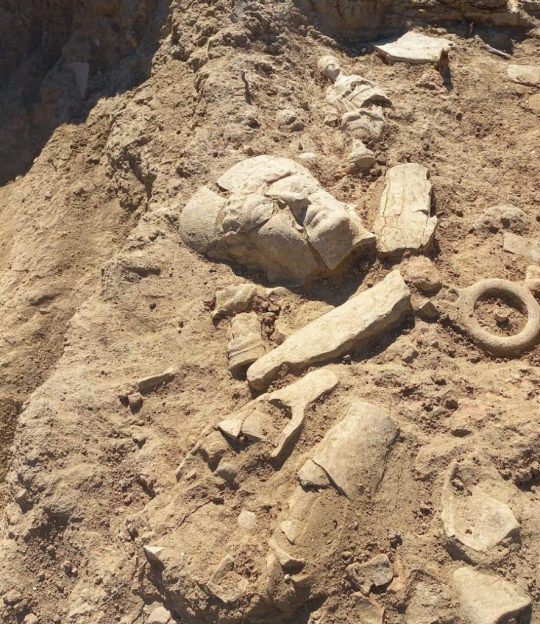
The votive deposit, which would appear to have been arranged above the destruction levels of the house, may tell the story of the time when its objects were recovered by the Akragantines after the destruction. To define with certainty the function of the interesting deposit will require further research, paying close attention to the stratigraphic connections between the deposit and the living and abandonment levels of the house.
The Valley of the Temples forms part of the ancient city of Agrigentum, situated in the province of Agrigento, Sicily. Since 1997, the Valley of the Temples (covering 3212 acres) has been included in the UNESCO World Heritage List.
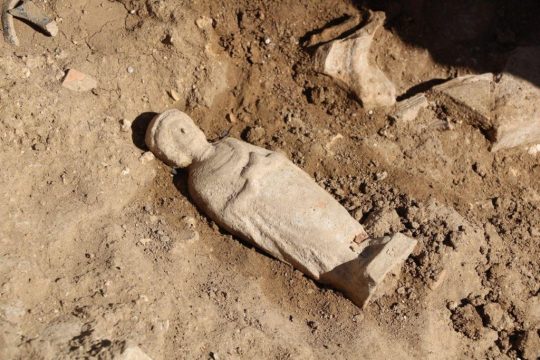
According to the Greek historian, Thucydides, Agrigentum was founded around 582-580 BC by Greek colonists from Gela in eastern Sicily, with further colonists from Crete and Rhodes. It was routed by the forces of Carthaginian general Himilko in 406 B.C. Agrigento’s residents fled to nearby Gela when Himilko sacked their city, but then he took Gela too. All of the Greek colonies on Sicily fell to Himilko and were made vassals of Carthage. Punic primacy would not last long, however. Timoleon of Corinth defeated Carthage in Sicily and liberated the Greek cities in 399 B.C.
By Leman Altuntaş.
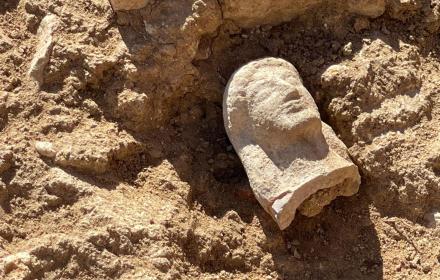
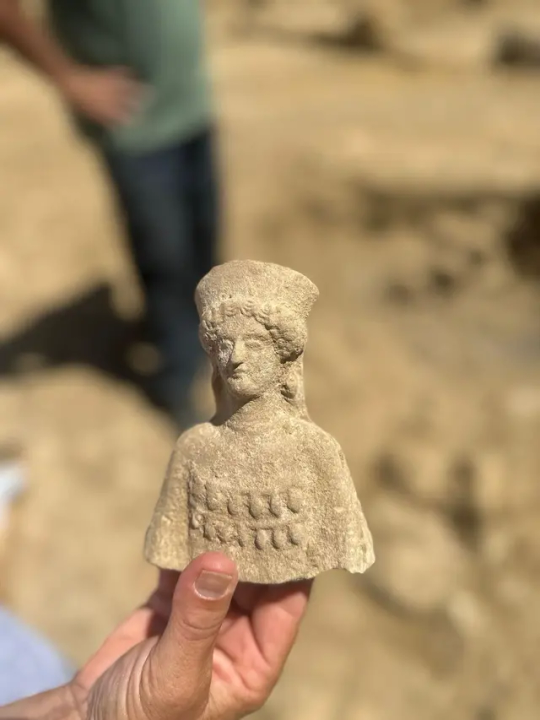

#Rich Votive Deposit Discovered in Sicily's Valley of the Temples#Valley of the Temples in Agrigento#temple of Juno#terracotta figurines#ancient artifacts#archeology#archeolgst#history#history news#ancient history#ancient culture#ancient civilizations#ancient sicily#ancient greece#greek history#greek art
274 notes
·
View notes
Text
A Celebration Canceled: Valentina Marcenaro’s Fight to Keep Jewish Culture Alive in Dresden
When Food Becomes a Political Battlefield
Can something as simple as food become a flashpoint in global conflicts? Is it now impossible to enjoy a serving of gefilte fish or hummus without invoking political strife? For Valentina Marcenaro, the answer is painfully clear. The chairwoman of Jewish Week Dresden, Marcenaro was forced to cancel the annual Gefilte Festival, a Jewish culinary celebration, due to mounting fears among participants. Scheduled for early November, the event was meant to showcase Jewish cuisine and culture, but growing insecurity made it impossible to proceed.
"Some of those who had been scheduled to take part in the festival were too scared to identify themselves as Jewish," Marcenaro explains. Despite her deep desire to go ahead with the event, she recognized that fear is not something to argue against but to respect. The current climate in Germany, particularly in Dresden, made it impossible for people to celebrate their own heritage without fear of reprisal.
A Life Woven with Jewish Culture
Marcenaro, 50, considers herself more culturally Jewish than religiously observant. Born in Italy, she moved to Dresden in 1998 with the intention of staying briefly to learn German—but love and life kept her rooted in the city. Her passion for Jewish culture has shaped her career, particularly in her role with Jewish Week Dresden, where she strives to teach people about the everyday aspects of Jewish life beyond its tragic history.
For Marcenaro, food is an essential tool for cultural understanding. "The best recipe against anti-Semitism," she believes, "is teaching people how to cook Jewish food." This sentiment has driven her mission to share Jewish cuisine with the broader German community, fostering connections through shared meals and traditions. But the cancellation of the Gefilte Festival has cast a shadow over her efforts.
A City’s Complicated Jewish History
Dresden’s Jewish community numbers around 700, with many members having arrived from Russia and Ukraine following the fall of the Berlin Wall. The city’s Jewish history is one of resilience, but also hardship. In East Germany, the Nazi terror was followed by communist-era anti-Semitism, leaving only a few hundred Jews in the region by the late 1980s. Today, Dresden remains a place where Jewish identity is often met with hesitation, if not outright hostility.
"Germans are rather inhibited when it comes to all things Jewish," Marcenaro observes. To many, Jewish identity is a mirror reflecting their own feelings of historical guilt rather than a vibrant, living culture. Through her work, she aims to change that by integrating Jewish traditions into everyday life—one meal at a time.
When Cuisine Becomes Controversial
The idea of cultural exchange through food is beautiful but, as Marcenaro has learned, also naive in today’s climate. Across the world, particularly in the United States, debates over food have turned political. The so-called "hummus wars" have reemerged, with accusations that Israel has "stolen" Lebanese and Palestinian dishes. Social media is flooded with calls to boycott Israeli restaurants, met with retaliatory smear campaigns against Palestinian-owned establishments. The kitchen, once a space of comfort and unity, has become yet another battlefield.
Marcenaro rejects these divisive narratives. "It’s nonsense," she says. "What others see as cultural appropriation, I see as diversity." Jewish cuisine, she explains, has always been a melting pot, reflecting the influences of the many places where Jewish communities have lived. From Ukrainian borscht to Sicilian Caponata, Jewish food is a testament to cultural fusion rather than theft.
Holding Onto Hope
On Marcenaro’s desk sits a porcelain pomegranate, a gift from Israel. The fruit, rich with seeds, is a symbol of fertility and abundance in Jewish culture and serves as the logo of the organization behind the Gefilte Festival. Though the festival has been canceled this year, Marcenaro refuses to give up hope.
For her, the act of sharing Jewish food remains an act of resilience. It is a way to ensure that Jewish culture is not only remembered but lived. Even in the face of fear, new beginnings are always possible.
#ValentinaMarcenaro#GefilteFestival#JewishCulture#Dresden#JewishFood#Antisemitism#JewishResilience#NeverAgain#CulturalUnderstanding#MiddleEastConflict
15 notes
·
View notes